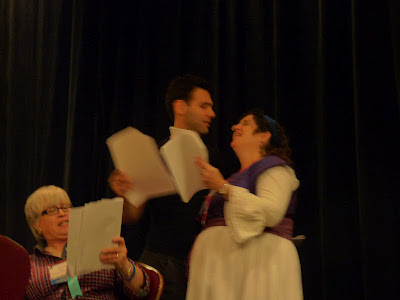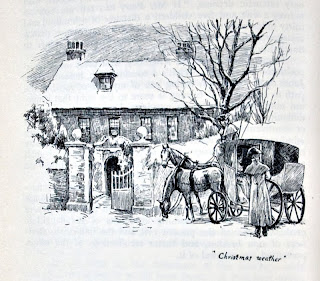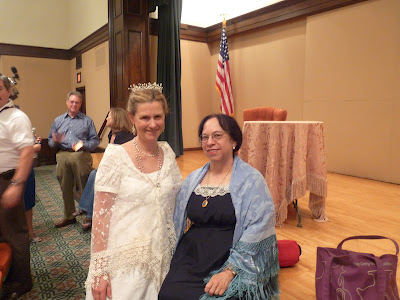"This will prove a spirited beginning of your winter engagements, sir.
Something new for your coachman and horses to be making their way through a
storm of snow," Mr. John Knightley snidely observed to his father-in-law Mr. Woodhouse in
Emma.
September is not nearly time for winter engagements (though the greeting card companies may think otherwise!), but my blog is experiencing "something new" today, fortunately not nearly as arduous as making its way through a snowstorm. It is part of
AUSTEN EXTRAVAGANZA, a famous all-Austen month-long blog block party put together by the innovative and charming
Meredith Esparza and
Jakki Leatherberry. The main site is here:
http://janeaustenreviews.blogspot.com/
And here is an Official Banner.
I was somewhat puzzled as to what my part would be, when assigned to a
"Traveling Tuesday," together with two other Austen authors,
Monica Fairview in London, who has written many Austenesque and Regency novels, most recently
The Other Mr. Darcy, and
Alexa Adams who lives in Delaware and is the author of
First Impressions. But, "It is such a happiness when good people get together," as Miss Bates said, and so we promptly and gleefully seized on Jane Austen's Rogues as our subject. From there it was the opposite of "an easy step to silence," as Catherine Moreland found about the topic of politics. Another Catherine, Lady Catherine de Bourgh, might have said, "I must have my share of the conversation, if the subject is Rogues." For it is irresistible, is it not?
Traveling Tuesday
Before launching into our Roguish Ruminations, let me explain how this little barouche-landau tour will work. It all starts on Alexa's blog, where I have left some Roguish Scratchings. You can read them here:
http://alexaadams.blogspot.com/ Do not, however, venture before
Traveling Tuesday the 18th, remember, for that is when all this merriment is due to burst forth upon a wondering world. I have only posted early here in order to get it finished - no, what I mean is that in the extremity of my enthusiasm I have been a bit previous!
I'm not exactly sure whether you're supposed to visit my blog next, or Monica's, but I am not tenacious about precedence (like Mary Musgrove) and am quite happy to come "last and least" like Fanny Price. At any rate, here is Monica's blog, where reside Alexa's guestly thoughts, or will reside on Tuesday:
http://monicafairview.blogspot.co.uk/2012/09/jane-austens-rogues-austenesque.html
And now that you are comfortably seated in my blog, it is my honour to present to you what Monica, my very first Guest Blogger ever in more than a hundred posts, has written:
Is a Rogue really a Rogue in Jane Austen? by Monica Fairview
Jane Austen
is often considered to be a moralist and a traditionalist at that. Some would
even go so far as to say that she tends to support the status quo and that her
novels reinforce the social norms of the day. A closer look at the boys and gals
she chose to be her “villains” reveals that she wasn’t as conventional as she
seems when it comes to traits she considered to be “evil”. Unlike the “horrid”
gothic novel of her day, she doesn’t have darkly evil characters who commit
every crime in the book, nor do we have helpless victims (often women) who are
subjected to abuse, abduction and imprisonment. In her Juvenilia
she makes fun of the very idea. Perhaps the only truly villainous villain in her
writings is Lady Susan Vernon, who torments her own daughter as she goes
on her merry way.
In Jane Austen’s
world, villainy is more subtle, not always easy to detect, and often inhabits a
grey area that isn’t quite defined. Things are neither black nor white. At times
this can be frustrating, because we want to know exactly who the antagonist is
and we want to see them punished, but more often than not, JA seems to let them
off the hook with little more than a slap on the wrist.
That isn’t to say
that JA doesn’t have “pet peeves” so to speak. There are certain qualities she
satirizes fairly consistently throughout her novels.
1.
Toadying in its many
forms, especially when it’s done for reasons of self-interest:
a.
Mr. Collins in
P&P and his obnoxious servile attitude towards Lady
Catherine.
b.
Who can forget Caroline
Bingley’s pathetic attempts to flatter Mr. Darcy?
c.
Sir Walter in
Persuasion who, in his vanity and desire to cut a fine
figure, fawns on the Dowager
Viscountess Dalrymple and wants Anne to
fawn on her, too.
2.
Those who interfere
in other people’s lives and try to control them
a.
Lady
Russell, who persuades Anne Elliott to give up Wentworth and makes her life
miserable as a consequence. Lady Russell’s interference comes to an end when
Anne undermines her authority by accepting Wentworth, but does she suffer for
it?
b.
Mrs. Bennett, who
ruins the very relationships she’s trying to promote. She never realizes how
much damage her interference has caused, and her only real punishment is when
her favourite Lydia runs away.
c.
Mr. Darcy (only
briefly), who convinces Bingley to leave Netherfield and persuades him that Jane
doesn’t care for him. Darcy receives his just punishment by having Lizzy turn
him down.
d.
Lady Catherine de
Bourgh who thinks all she has to do is wave her magic wand and she’ll
convince Elizabeth to give up Darcy.
e.
The tyrant General
Tilney, who has his daughter and son by the throat and dictates every moment
of their lives, including arranging for Catherine to come to Northanger
Abbey when he thinks she has money, and disposing of her ruthlessly when he
discovers she doesn’t. He’s the closest we have to a gothic villain we see in
Austen, but then the whole novel is a take on the Gothic.
f.
Emma, who thinks she
can arrange people’s lives as she pleases but ends up making a fool of herself.
3.
Those guilty of
deception
a.
Willoughby, who
marries an heiress then regrets losing Marianne. Willoughby is not only guilty
of double-dealing with Marianne; he has also seduced a young girl and takes no
responsibility for her baby. Not unusual in those days, but despicable
nevertheless considering Colonel Brandon has to pick up the pieces.
b.
Wickham spreads lies
about Darcy and runs away secretly with Lydiagets all his debts paid off but
ends up stuck with Lydia and sent to the north where presumably his
opportunities of seducing local ladies is more restricted.
c.
Frank Churchill, who
marries the woman he loves after giving the impression he’s interested in Emma.
d.
Edward Ferrars who
makes poor Elinor suffer so much, but everything is resolved very smoothly for
him when Lucy transfers her affection to his brother.
e.
Mrs. Clay, whose
plotting and planning comes to naught when she loses the chance to marry Sir
Walter.
f.
Mr. Elliott whose
“love” for Anne is accompanied by some underhanded plans with Mrs. Clay.
g.
Isabella Thorpe, who
is less inclined to like James Morland when she realizes he doesn’t have money.
But did she really hope to catch a rake like Captain Tilney? Isabella lies to
Catherine on several occasions and takes advantage of Catherine’s naiveté.
Really, she’s there as a foil, a jaded woman-about-town. It would be interesting
to compare her to Caroline Bingley (of course I’d think that, since my novel The
Other Mr. Darcy is about Caroline).
4.
Those who have no sense
of responsibility or the consequences of their actions. These are the
flighty types of whom Lady Susan is an extreme example.
a.
Lydia, who remains
blissfully unaware of the uproar her escape with Wickham causes. Her punishment
is to be married to a man like Wickham who is going to be unfaithful to her at
the drop of the hat, but it’s a case of “she’s made her bed, now she has to lie
in it.”
b.
John
Thorpe, really, why does he tell the Tilneys that Catherine is rich?
It certainly triggers a lot of things but it doesn’t serve his own
interest.
c.
Henry Crawford,
proposing to Fanny then running off with Maria? Well, he’s on the scandal
sheets, so he gets some negative exposure.
d.
Mary Crawford, she
doesn’t get Edmund, but just as well, she didn’t really want to marry a preacher
anyway. She doesn’t do anything evil except try to steal Edmund from Fanny (a la
Caroline Bingley), but she’s bad because she doesn’t think Henry did anything
wrong.
Conclusion: In many ways Jane Austen’s villains aren’t true
full-fledged villains. I’d agree with Diana that the villains are really people
who make the heroine unhappy – most often intentionally deceiving her or
preventing her from accomplishing her aims. I agree with Alexa that Willoughby
and Wickham are the worst of the lot, mostly because they have no hesitation
lying to those around them and they have no hesitation in seducing a young girl
of fifteen, ruining her reputation, and abandoning her to her fate.
*****************
Two Rowlandson Rogues
In parting, Monica graciously posed some questions for us. I will give my answers, and would be charmed if any readers would like to give their own as well. Let my "Comments" section become a theatre of lively disputation, though hopefully not so spirited as the riot Henry Tilney describes: "a mob of three thousand men assembling in St. George’s Fields, the Bank
attacked, the Tower threatened, the streets of London flowing with blood, a
detachment of the Twelfth Light Dragoons (the hopes of the nation) called up
from Northampton to quell the insurgents..."
1. Who do you think was
punished most severely?
Ah, poor Maria, to be sure. Eternity with Mrs. Norris would confound the Frenchman who wrote the play
No Exit. Surely a little fornication does not deserve such penance as that. Even if you believe that Adultery should be severely dealt with, like Mr. Price, who thought that "A little flogging for man and woman too would be the best way of
preventing such things" (on second thought, perhaps he meant a little blogging?), surely a Norrisean Eternity would be more worthy of such sins as Murder and Treason.
2. Who do you think gets let
off most easily?
Probably Mr. Wickham. He deserves gaol, that one.
3. Do you think the women
get a worse punishment than the men?
Their lives were a worse punishment in those days, so yes, certainly.
4. If you got to rewrite the
ending of any of the novels, who would you choose to punish and why?
I think I would be inclined to be more merciful. I would let Mary Crawford find love. I would let Sir Walter Elliot find a rich widow. But I am so fond of all of Jane Austen's characters, I wish them all well, even the rogues and villains. Well, no, there are a few to whom even I could not show mercy. Mrs. Norris (but she gets what she deserves), and General Tilney, who goes completely unpunished! I would involve him in a very nasty public scandal at the very least. Rat bastard.
Now go on, have your say, and leave some quilled chicken tracks behind in the Comments, so I may have the memory of many visitors. I hope you have enjoyed the "Light, Bright, and Sparkling" portion of the Austen Extravaganza!
Diana Birchall, proferring something light, bright, and sparkling to drink, and some rout cakes.
What I hope my Comments section will soon resemble.




































































